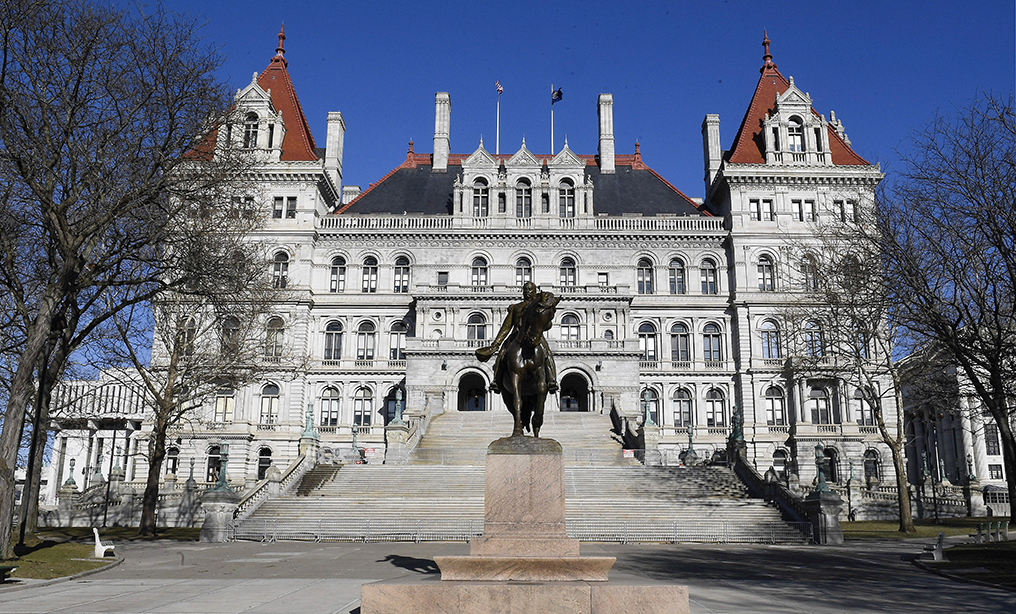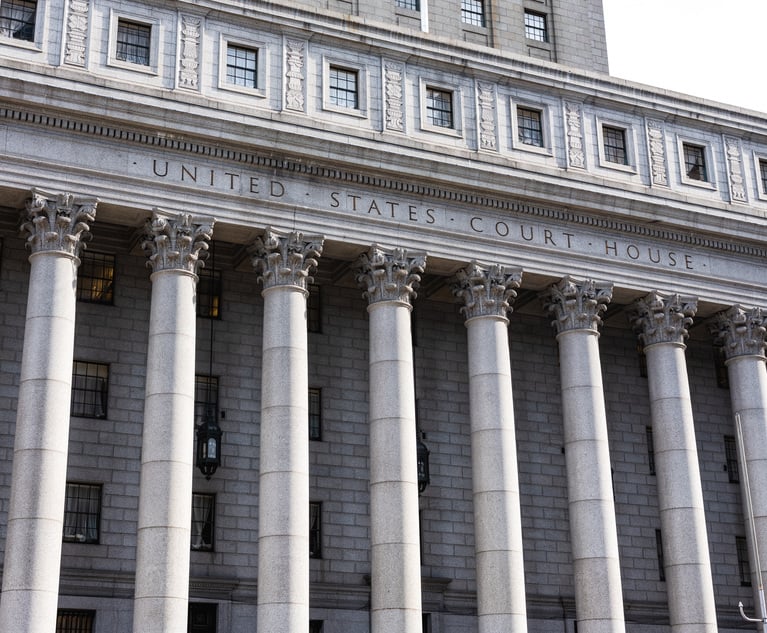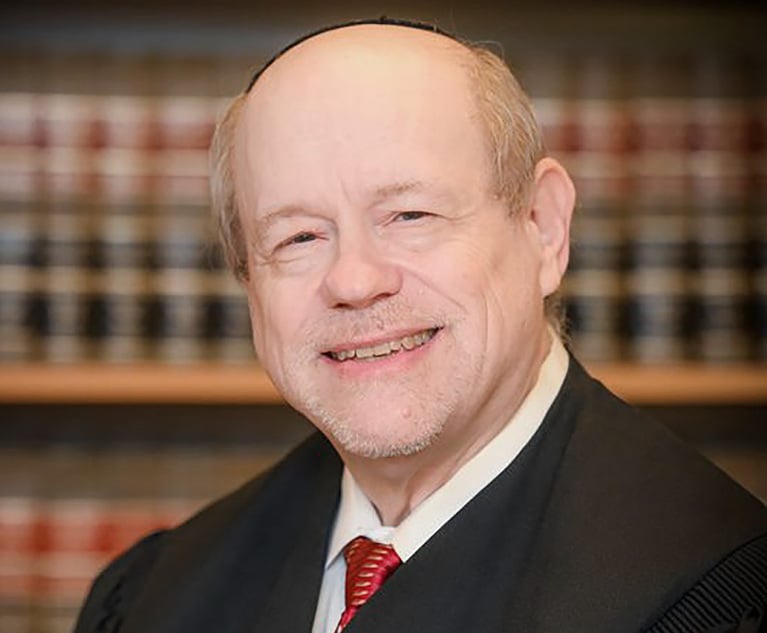Now Is Not the Time To Defund the Courts
Now that the Legislature has reconvened and Gov. Andrew Cuomo has issued warnings that the state budget will have to be cut unless federal funding is made available, it is time to consider the effect such budget cuts will have on the operation of the courts.
May 29, 2020 at 10:00 AM
4 minute read
 New York state Capitol in Albany. (AP Photo/Hans Pennink)
New York state Capitol in Albany. (AP Photo/Hans Pennink)
A significant financial crisis is looming for New York state courts and those who use the courts to resolve their legal problems. This crisis will be greatly compounded because of the current hardship arising out of the COVID-19 crisis, unless some kind of urgent action is taken.
Now that the Legislature has reconvened and Gov. Andrew Cuomo has issued warnings that the state budget will have to be cut unless federal funding is made available, it is time to consider the effect such budget cuts will have on the operation of the courts.
In the Financial Plan for Fiscal Year 2021 released in early May, the State Budget Director warned that significant cuts in state spending would take place, unless the Legislature responds with a plan of its own. The Legislature granted the Budget Director the authority to reduce aid-to-localities appropriations and disbursements by any amount needed to achieve a balanced budget and states that the Financial Plan "assumes that the Judiciary and elected officials will initiate comparable reductions in their budgets for FY 2021."
At the Fund for Modern Courts, a non-partisan organization committed to improving the court system, we do not see how the Judiciary can absorb the cuts of least 10% as suggested in the Financial Plan without significantly impacting the administration of justice in this state. We are particularly concerned about cuts to those service organization that represent individuals of limited means, victims of domestic violence, immigrants, tenants, small businesses, and many more.
Given the flood of new cases expected over the next several months as the courts fully reopen, the impact of cuts is dire especially to the most vulnerable in our society, including those hardest hit by COVID-19, who will need representation in cases involving potential homelessness, food insecurity, unemployment, mortgage foreclosure, domestic violence, and whatever else lies in the wake of this unprecedented challenge to public safety.
The last time the Judiciary budget was cut, by $170 million in April 2011, the impact on the court system was serious and widespread, resulting in the reduction in hours that court facilities were able to operate, drastic staffing cuts, and mounting backlogs. Layoffs, early-retirement programs, and hiring freezes resulted in 1,151 fewer employees.
Budget cuts of 10% this year would exceed $200 million and would have an even greater impact on court operations than the cuts in 2011.
So what does all of this mean? Two things cry out. First, the bleak financial outlook for New York—a direct result of COVID-19—calls for an immediate round of federal funding directed to the states. Second, regardless of whether and to what extent federal funding comes through, the Judiciary should be spared the level of budget cuts now being contemplated. Treating the Judiciary simply as a state agency worthy of across-the-board cuts is not only bad public policy but poses a threat to the very fabric of our society. "Equal Justice Under Law" is not only a catchy phrase appearing above the entrance to the U.S. Supreme Court, it is a fundamental principle essential to a free and fair society that requires a strong and independent Judiciary. That is true in the best of times and is especially true today.
Given the complexity of issues relating to the current pandemic, we recommend the creation of a Special Commission on COVID-19 and the Courts, consisting of bar leaders, civil legal service providers, criminal defense attorneys, prosecutors, and community-based organizations to make recommendations about how best to meet the demands of surging legal needs throughout the State.
Now is not the time to defund the courts. Now is the time to take bold action. We need to simplify New York's court system, fund organizations which serve those most impacted by this public health crisis, and preserve the jobs of those who make the justice system work for all New Yorkers. They are the next wave of first responders to get us through this crisis.
William C. Silverman, a partner at Proskauer Rose, is the Vice-Chair of the Fund for Modern Courts.
This content has been archived. It is available through our partners, LexisNexis® and Bloomberg Law.
To view this content, please continue to their sites.
Not a Lexis Subscriber?
Subscribe Now
Not a Bloomberg Law Subscriber?
Subscribe Now
NOT FOR REPRINT
© 2025 ALM Global, LLC, All Rights Reserved. Request academic re-use from www.copyright.com. All other uses, submit a request to [email protected]. For more information visit Asset & Logo Licensing.
You Might Like
View All
Decision of the Day: Qui Tam Relators Do Not Plausibly Claim Firm Avoided Tax Obligations Through Visa Applications, Circuit Finds

'Serious Legal Errors'?: Rival League May Appeal Following Dismissal of Soccer Antitrust Case
6 minute read
Decision of the Day: Judge Sanctions Attorney for 'Frivolously' Claiming All Nine Personal Injury Categories in Motor Vehicle Case

Law Firms Mentioned
Trending Stories
- 1NBA Players Association Finds Its New GC in Warriors Front Office
- 2Prenuptial Agreement Spousal Support Waivers: Proceed With Caution
- 3DC Circuit Keeps Docs in Judge Newman's Misconduct Proceedings Sealed
- 4Litigators of the Week: US Soccer and MLS Fend Off Claims They Conspired to Scuttle Rival League’s Prospect
- 5Litigator of the Week Runners-Up and Shout-Outs
Who Got The Work
J. Brugh Lower of Gibbons has entered an appearance for industrial equipment supplier Devco Corporation in a pending trademark infringement lawsuit. The suit, accusing the defendant of selling knock-off Graco products, was filed Dec. 18 in New Jersey District Court by Rivkin Radler on behalf of Graco Inc. and Graco Minnesota. The case, assigned to U.S. District Judge Zahid N. Quraishi, is 3:24-cv-11294, Graco Inc. et al v. Devco Corporation.
Who Got The Work
Rebecca Maller-Stein and Kent A. Yalowitz of Arnold & Porter Kaye Scholer have entered their appearances for Hanaco Venture Capital and its executives, Lior Prosor and David Frankel, in a pending securities lawsuit. The action, filed on Dec. 24 in New York Southern District Court by Zell, Aron & Co. on behalf of Goldeneye Advisors, accuses the defendants of negligently and fraudulently managing the plaintiff's $1 million investment. The case, assigned to U.S. District Judge Vernon S. Broderick, is 1:24-cv-09918, Goldeneye Advisors, LLC v. Hanaco Venture Capital, Ltd. et al.
Who Got The Work
Attorneys from A&O Shearman has stepped in as defense counsel for Toronto-Dominion Bank and other defendants in a pending securities class action. The suit, filed Dec. 11 in New York Southern District Court by Bleichmar Fonti & Auld, accuses the defendants of concealing the bank's 'pervasive' deficiencies in regards to its compliance with the Bank Secrecy Act and the quality of its anti-money laundering controls. The case, assigned to U.S. District Judge Arun Subramanian, is 1:24-cv-09445, Gonzalez v. The Toronto-Dominion Bank et al.
Who Got The Work
Crown Castle International, a Pennsylvania company providing shared communications infrastructure, has turned to Luke D. Wolf of Gordon Rees Scully Mansukhani to fend off a pending breach-of-contract lawsuit. The court action, filed Nov. 25 in Michigan Eastern District Court by Hooper Hathaway PC on behalf of The Town Residences LLC, accuses Crown Castle of failing to transfer approximately $30,000 in utility payments from T-Mobile in breach of a roof-top lease and assignment agreement. The case, assigned to U.S. District Judge Susan K. Declercq, is 2:24-cv-13131, The Town Residences LLC v. T-Mobile US, Inc. et al.
Who Got The Work
Wilfred P. Coronato and Daniel M. Schwartz of McCarter & English have stepped in as defense counsel to Electrolux Home Products Inc. in a pending product liability lawsuit. The court action, filed Nov. 26 in New York Eastern District Court by Poulos Lopiccolo PC and Nagel Rice LLP on behalf of David Stern, alleges that the defendant's refrigerators’ drawers and shelving repeatedly break and fall apart within months after purchase. The case, assigned to U.S. District Judge Joan M. Azrack, is 2:24-cv-08204, Stern v. Electrolux Home Products, Inc.
Featured Firms
Law Offices of Gary Martin Hays & Associates, P.C.
(470) 294-1674
Law Offices of Mark E. Salomone
(857) 444-6468
Smith & Hassler
(713) 739-1250






